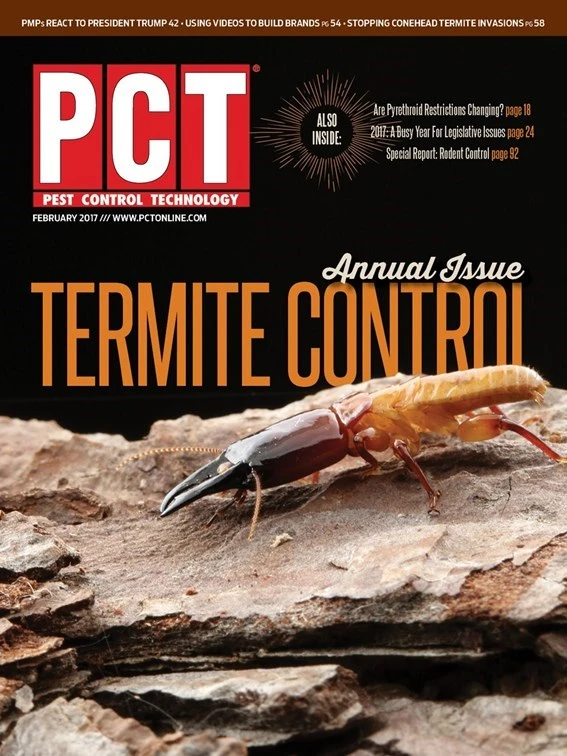
The PCT-NPMA 2016 Business Outlook survey was closed on November 7. The next day, the biggest political upset in modern American history occurred when Republican Donald Trump defeated expected winner, Democrat Hillary Clinton.
It’s too early to say specifically how the Trump administration will impact the economy and the pest management industry, in particular. And it may take months, even years, to amend and replace existing regulations depending on the new administration’s priorities. (These will become clearer in the first 100 days of the Trump presidency.) Still, government affairs specialists expect a much friendlier pro-business environment to prevail.
REGULATORY IMPACT. From an environmental regulatory standpoint, the surprise election result was “like God dropping the biggest gift from heaven at the least expected time in your life,” said David Crow, president of D.C. Legislative and Regulatory Services and a lobbyist for RISE (Responsible Industry for a Sound Environment), which represents pesticide manufacturers.
It is a “gift of gigantic proportions to the business community and the pest management industry” for the “very simple reason that EPA will change its tone,” said Crow.
He expects to see “a lot of lightening up” in environmental regulations and for the Trump administration to install the kinds of folks at EPA who worked for George W. Bush and Bill Clinton. You didn’t always get your way then but at least you were heard and “from the business perspective, that is a huge, huge plus,” said Crow. The transition team that the president has selected “tells me that I think we’re in a good place,” said Crow. In February, the U.S. Senate was expected to vote on President Trump’s nominee to lead EPA, Oklahoma Attorney General Scott Pruitt, who has been critical of federal environmental rules and favors a states’ rights approach to these matters.
Andrew Bray, director of public policy at the National Pest Management Association, hopes the Trump administration will “bring back some clarity and normalcy” to EPA’s product review and re-review processes. It is key that EPA does “what FIFRA said it’s supposed to do,” he said. At times during the Obama administration this didn’t always appear to be the case.
Crow expects new EPA leadership to rely more on cost-benefit analyses and to “go back to just following the law” instead of expanding their influence through executive order.
It is important that the agency get an “appropriate amount of funding and staffing” so the industry can get access to products in a timely manner, Bray said.
One regulation that “will certainly impact our industry” regardless of presidential administration is the new certification and training rule, which raises the minimum standards for certification and training in all 50 states, said Bray. The final rule, published in December, incorporated many of NPMA’s recommendations. The association collaborated with EPA to make sure “we were doing things that made sense” in promoting the safe handling of pesticides, he said.
The new administration also is likely to address clean air regulations and redefine the waters of the U.S. (those bodies of water that fall under federal jurisdiction).
OTHER BUSINESS REGS. Another regulation likely to change is the Department of Labor’s overtime rule, which a federal court blocked on Nov. 22. “Whatever the rule looks like moving forward, I think there’s an opportunity for the regulation to be rewritten,” said Bray. Some bipartisan support exists for phasing in the rule, delaying it or carving out exemptions for small business, he said. NPMA will continue to work on this issue as part of a large business coalition, the Partnership to Protect Workplace Opportunity.
In addition, businesses likely will see modifications to or a replacement for the Affordable Care Act, a less active OSHA and a simplified tax code. Lower corporate tax rates are “important to us as an industry” as PMPs could invest that money into new products, people and operations, Bray said.
PICKING OUR BATTLES. Crow cautioned the pest management industry on expecting immediate or expansive changes. “We’re not going to see everything we didn’t like reversed. You’ve got to spend your capital wisely” on the most important issues, he said.
Given the opportunity to amend regulations, Bray urged pest management professionals “to play a constructive role” in the process.
The author is a frequent PCT contributor.

Explore the February 2017 Issue
Check out more from this issue and find your next story to read.
Latest from Pest Control Technology
- Hygiene IQ Uses Smart Sensor Technology to Detect Rodents
- Rollins Acquires Saela Pest Control
- PCT Spotlights Leaders in Pest Management for Women’s History Month
- Honey Bee Colony Losses Could Reach up to 70 Percent, WSU Researchers Report
- SiteOne Hires Dan Carrothers as Vice President of Agronomic Business Development
- U.S. Structural Pest Control Market Grew Nearly 8% in 2024, Specialty Consultants Reports
- Hands United Foundation Supports PMPs in Hardship Through Financial Relief
- Proven Pest Exclusion Solutions






